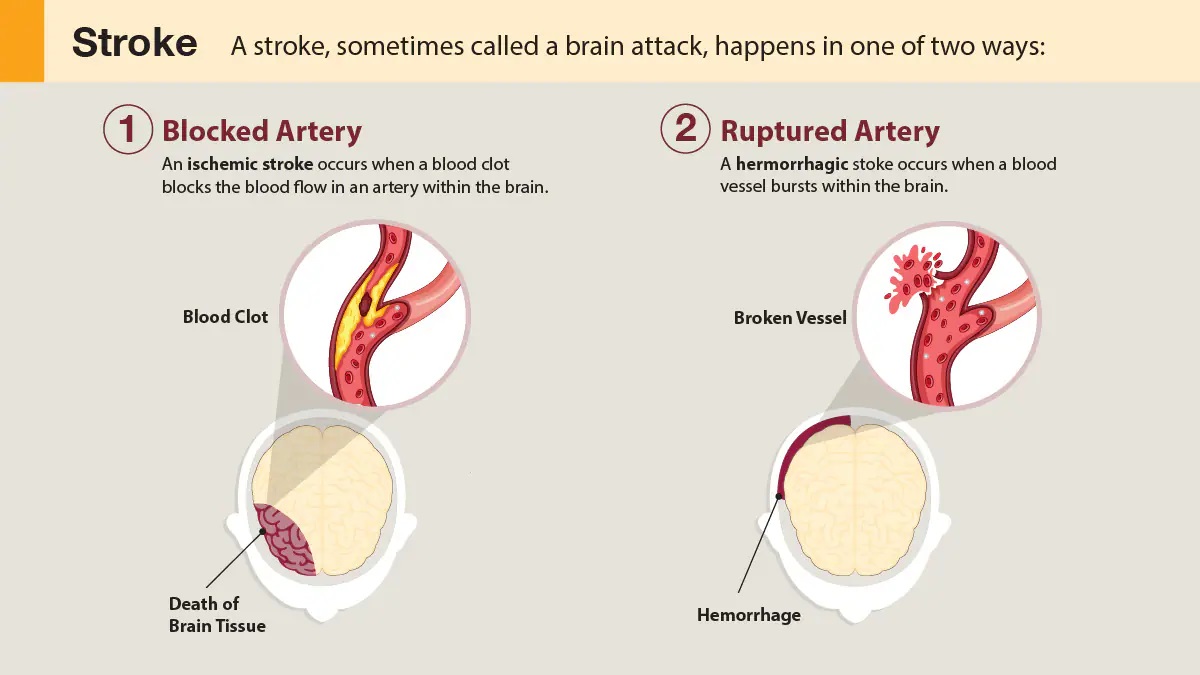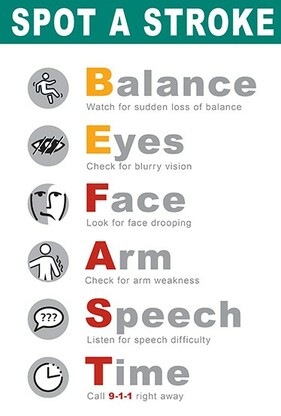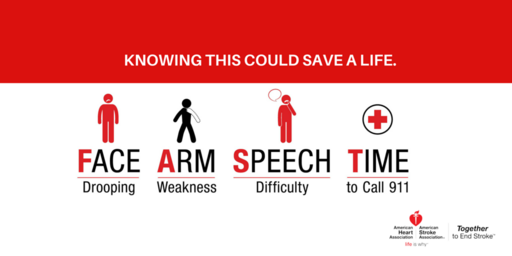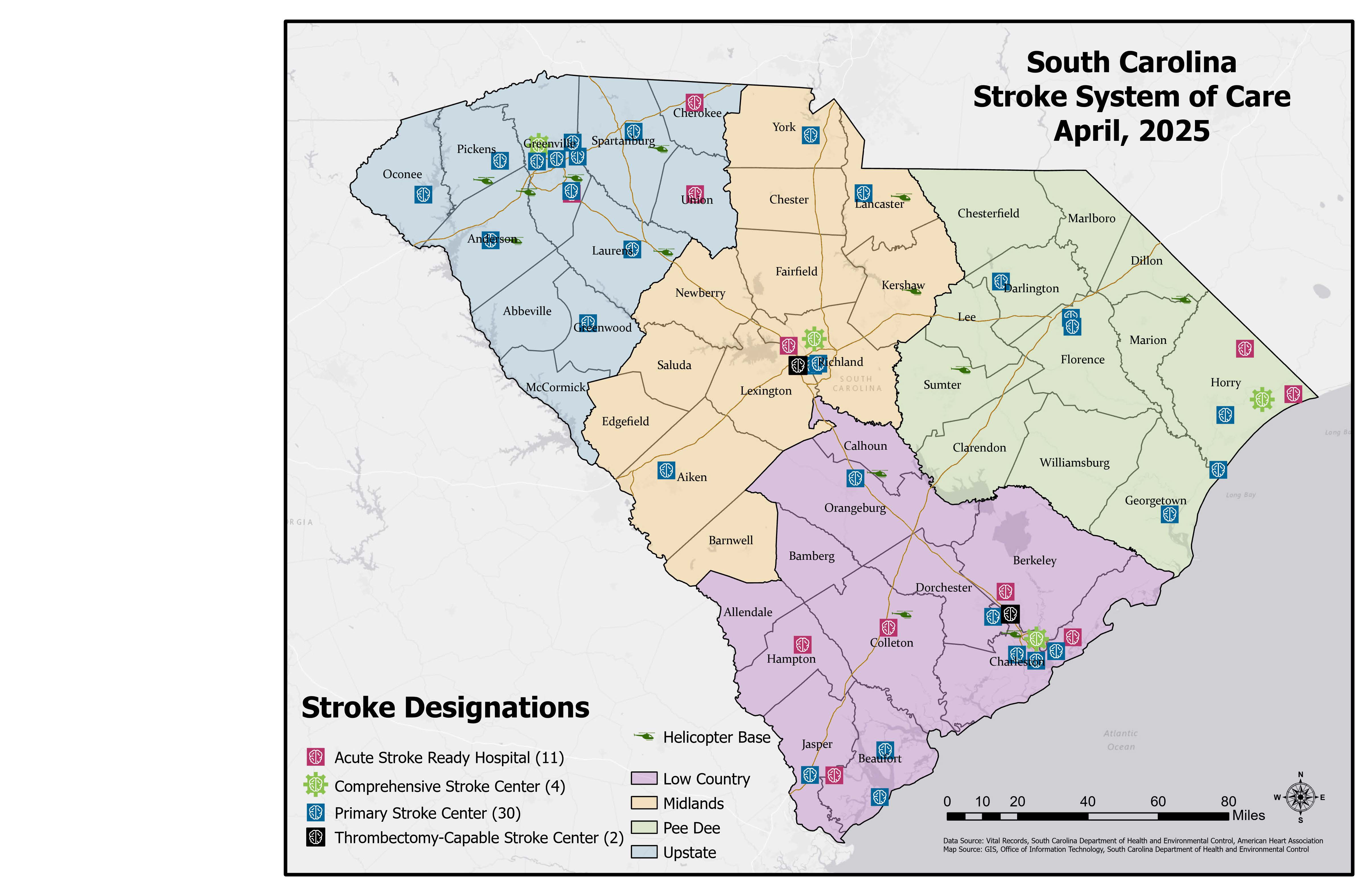Stroke is South Carolina's 5th Biggest Killer.
- 20,879: The number of emergency department visits for stroke in South Carolina in 2022.
- 17,765: The number of hospitalizations for stroke in South Carolina in 2022.
- $1.5 billion: The total hospitalization charges due to stroke in South Carolina in 2022.
What is a Stroke?
A stroke is an emergency! A stroke, sometimes called a brain attack, occurs when something blocks blood supply to part of the brain or when a blood vessel in the brain bursts. In either case, parts of the brain become damaged or die. A stroke can cause lasting brain damage, long-term disability, or even death.


Warning signs of a stroke
- Sudden numbness or weakness of the face, arm or leg, especially on one side of the body
- Sudden confusion, trouble speaking or understanding
- Sudden trouble seeing in one or both eyes
- Sudden trouble walking, dizziness, loss of balance or coordination
- Sudden, severe headache with no known cause
Act Fast. Call 9-1-1!
- If you think you're having a stroke, call 9-1-1 right away - not a friend.
- Calling 9-1-1 is the best way to get to the hospital.
- Emergency medical services (EMS) staff can begin life-saving treatment immediately.
- You're likely to receive faster treatment at the hospital if you arrive by ambulance.
- Never drive yourself or have someone drive you to the hospital unless you have no other option.

What Increases Your Risk for a Stroke?
Several factors make it more likely you will have a stroke. Some you can control and some you cannot.
Risk factors you can control
- High blood pressure is the strongest predictor of a stroke. Someone with high blood pressure has a much greater chance of stroke before age 80.
- Smoking can lead to blood clots and raise blood pressure
- Excessive alcohol intake
- Diabetes
- High cholesterol
- Physical Inactivity &/or being obese
- Heart disease: Stroke and heart disease share many risk factors. Over time, high cholesterol, high blood pressure, not getting enough exercise, and being overweight, can cause changes in the heart and/or blood vessels that can lead to stroke and other cardiac events.
- Transient Ischemic Attacks (TIAs), also known as mini-strokes.
Risk factors you cannot control
- Age: Although stroke can occur at any age, the risk doubles every decade between the ages of 55 and 85.
- Race: Blacks and Hispanics are more prone to stroke.
- Gender: Women have a higher lifetime risk of stroke than men.
- Prior Strokes
Reduce Your Stroke Risk
- Check your blood pressure and control it
- Stop smoking
- Manage your diabetes
- Check your cholesterol and control it
- Eat a healthy diet
- Exercise at least 30 minutes on most days of the week
Why Choose a Hospital with a Designated Stroke Center?
Stroke is a medical and/or surgical emergency. Governing bodies verification and designation requirements set strict requirements, to include standards, clinical practice guidelines, and performance measurement for staffing of resources and specialists, response times, training, performance improvement and stroke prevention activities at stroke centers. Stroke centers have dedicated and organized stroke teams that respond promptly. The Stroke Medical Director (A physician responsible for stroke care) and Stroke Program Director are responsible to ensure compliance with the requirements, and for carrying out all activities associated with the stroke program. Hospitals that are not designated as stroke centers may have, and be staffed by, an emergency room physician but not have organized teams led by physicians trained in interventional neurological or surgical procedures to manage ischemic or hemorrhagic stroke. These facilities focus on evaluation, stabilization, and transfer to an appropriate facility for further care.
South Carolina Stroke Centers
The following is a list of stroke centers are based on the level of designation.

Comprehensive Stroke Centers
These facilities can meet concurrently emerging needs of multiple complex stroke patients. The CSC will provide support for all South Carolina hospitals as a referral source for high level neurological critical care, medical, interventional, surgical capabilities, and stroke research.
Thrombectomy- Capable Stroke Center (TSC)
These facilities do all that Primary Stroke Centers do, plus have the tools and the expertise to perform mechanical thrombectomy, a minimally invasive surgical procedure to remove a blood clot from an artery. These centers also have neurointensive care and 24/7 on-site critical care coverage primary Stroke Centers The only difference in this and a Comprehensive Stroke Center is that the CSC has ongoing stroke research.
Primary Stroke Centers (PSC)
Ability to care for patients with acute ischemic stroke; Rapid assessment, imaging, and able to administer intravenous thrombolytic therapy.
Acute Stroke Ready Hospitals
These facilities are equipped to treat stroke patients with timely, evidence-based care prior to transferring them to a Primary, Thrombectomy Capable, or Comprehensive Stroke Center.
Upstate Region
Comprehensive Stroke Centers
- Prisma Health Greenville Memorial Hospital (Greenville)
Primary Stroke Centers
- AnMed Health Medical Center (Anderson)
- Bon Secours St Francis Hospital Eastside (Greenville)
- Bon Secours St. Francis Downtown (Greenville)
- Prisma Health Baptist Easley Hospital (Easley)
- Prisma Health Greer Memorial Hospital (Greer)
- Prisma Health Hillcrest Hospital (Simpsonville)
- Prisma Health Laurens County Hospital (Clinton)
- Prisma Health Oconee Memorial Hospital (Seneca)
- Self Regional Healthcare (Greenwood)
- SRHS Pelham Medical Center (Greer)
- SRHS Spartanburg Medical Center (Spartanburg)
Acute Stroke Ready Hospitals
- SRHS Cherokee Medical Center (Gaffney)
- SRHS Union Medical Center (Union)
- Bon Secours St. Francis Emergency Center (Simpsonville)
Midlands Region
Comprehensive Stroke Centers
- Prisma Health Richland Hospital (Columbia)
Thrombectomy Capable Centers
- Lexington Medical Center (West Columbia)
Primary Stroke Centers
- Aiken Regional Medical Center (Aiken)
- MUSC Health Columbia Downtown (Columbia)
- MUSC Health Lancaster Medical Center (Lancaster)
- Piedmont Medical Center (Rock Hill)
- Prisma Health Baptist Hospital (Columbia)
Acute Stroke Ready Hospitals
- Prisma Health Baptist Parkridge (Columbia)
Pee Dee Region
Comprehensive Stroke Centers
- Grand Strand Medical Center (Myrtle Beach)
Primary Stroke Centers
- Carolina Pines Regional Medical Center (Hartsville)
- Conway Medical Center (Conway)
- McLeod Regional Medical Center (Florence)
- MUSC Health Florence Medical Center (Florence)
- Tidelands Georgetown Memorial Hospital (Georgetown)
- Tidelands Waccamaw Community Hospital (Murrells Inlet)
Acute Stroke Ready Hospitals
- McLeod Health Loris (Loris)
- McLeod Health Seacoast (Little River)
Lowcountry Region
Comprehensive Stroke Centers
- MUSC Medical University of South Carolina (Charleston) CSC
Thrombectomy Capable Centers
- Trident Medical Center (North Charleston)
Primary Stroke Centers
- Beaufort Memorial Hospital (Beaufort)
- Bon Secours St. Francis Hospital (Charleston)
- Coastal Carolina Hospital (Hardeeville)
- East Cooper Medical Center (Mount Pleasant)
- Hilton Head Hospital (Hilton Head Island)
- MUSC Health (Orangeburg)
- Roper Hospital (Charleston)
- Summerville Medical Center (Trident Health Summerville)
Acute Stroke Ready Hospitals
- Colleton Medical Center (Walterboro)
- Hampton Regional Medical Center (Varnville)
- Roper St. Francis Berkeley Hospital (Summerville)
- Roper St. Francis Mount Pleasant Hospital (Mount Pleasant)
- Tidewatch Freestanding Emergency Department (Bluffton)
For more information regarding the South Carolina Stroke System of Care, please contact Stroke Program Coordinator, Allison McElveen, with the DPH EMS and Trauma Section, at (803) 545-4958, mcelveas@dph.sc.gov, or stroke@dph.sc.gov.
Additional Information
- American Heart Association: www.heart.org
- American Stroke Association: www.strokeassociation.org
- Centers for Disease Control and Prevention: www.cdc.gov/stroke
- Centers for Disease Control and Prevention: https://www.cdc.gov/stroke/about.htm
Related Topics
- "Fast Reaction" stroke awareness radio PSA (.wav)
- Support for young stroke survivors in SC
- Stroke and Cholesterol (pdf)
- Warning Signs of Stroke (pdf)
- 2024 Stroke Camp
- South Carolina Stroke System of Care
South Carolina Support and Rehabilitation Services Links
- Low Country Stroke Support Group
- Telerehab Occupational Therapy at MUSC
- Physical, Occupational and Speech Therapy Clinics
- Trident Stroke Support Group
- Young Stroke Survivors Support Group
- Prisma Health Upstate Stroke Club Support Group
- Clemson Stroke Support Group
- 2023 Aphasia Support Group Schedule
- 2024 Prisma Health Stroke Camp
Face Arms Speech and Time Videos
- https://www.youtube.com/watch?v=fsdE-3U26gs
- https://www.youtube.com/watch?v=cPVr-PjT1qU
- https://www.youtube.com/watch?v=pq0jeh4THvI
- https://www.youtube.com/watch?v=5A_PLjjTdGc
- https://www.youtube.com/watch?v=TkCM5OG-LfE
- https://www.youtube.com/watch?v=bc2_sQ3kK6U
- https://www.youtube.com/watch?v=TnMBg6jnJrs
- https://www.youtube.com/watch?v=wAwvAsR1UTo
- https://www.youtube.com/watch?v=ftMRx7E-w1Y
- https://www.youtube.com/watch?v=zyxGqVbUz8U

